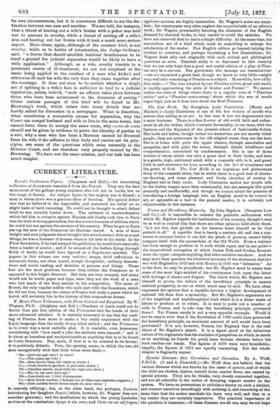CURRENT LITERATURE.
Rqsiel's Posthumous Papers. (Chapman and Hall.)--An interesting collection of documents translated from the French. They are the best monument of the gallant young engineer who fall not in battle, but on the range of Satory. An unique figure in the mighty war is Rosso'; a an in whom there was a genuine fibre of heroism. His special defect was that he believed in the impossible, and sustained his belief on no slight basis of hard reasoning. Ho could not be brought to admit defeat dantil ho was actually beaten down. The outburst of insubordination
'which led him to conspire against Bazaine and finally took him to Paris was the trait of strong patriotism, but also a consciousness of abilities which ho could not use against the enemies of his country. When he got to Paris ain-Ing the men of the Commune his illusions ceased. A man of keen insight and sure judgment when brought into actual contact with ram and
things, he was a dreamer of dreams when in his tent or his study. In the First Revolution, if he had escaped the guillotine, he would have assuredly been a leader of armies ; and if he missed all the bullets flying through Colds of battle, he would have figured as a Napoleonic marshal. The papers in this volume are very various ; essays, brief reflections in axiomatic forms, not often sound, always thoughtful ; military disserta- tions well worth reading, and sketches of persons and things. These last aro the most precious, because they outline the Commune as it appeared to this bright observer. But they aro very unequal, and many would not be worth paper and type, were they not the work of a man who had much of the fiery martyr in his composition. The name of Rosso', the only regular soldier who took part with the Commune, which ise did not love, because the rulers of France had made a peace which he hated, will certainly live in the history of this stupendous drama.


































 Previous page
Previous page